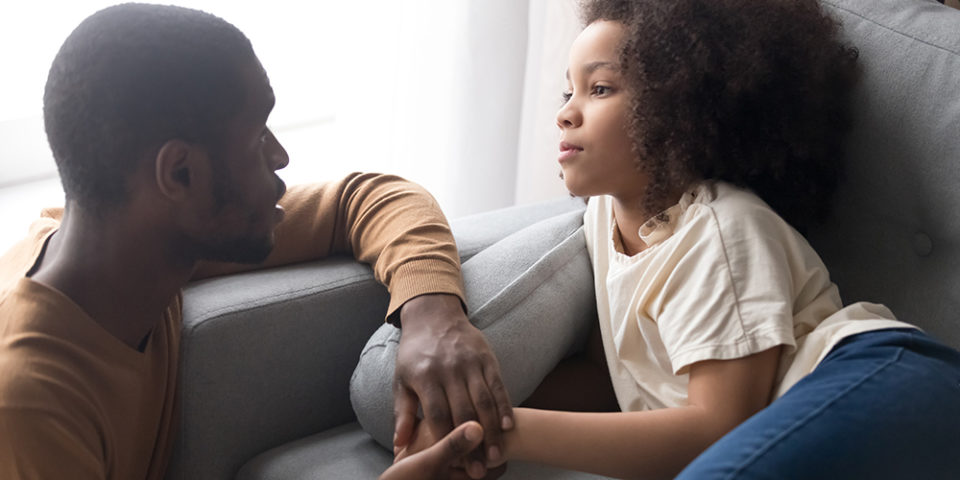How to talk to kids about school shootings
In the wake of tragedies like the Robb Elementary School shooting in Uvalde, Texas, parents throughout the nation are struggling with what to say to worried kids. Peter Loper, MD, discussed how to talk to kids about school shootings and ways to be a strong and solid comforting presence during uncertain times.
For younger children, less is more
As a parent, it is understandable that we want to try and explain everything to our children after something like this occurs,” said Dr. Loper. “The truth, though, is that too much information can actually be overwhelming.”
Events like school shootings happen outside the day-to-day experience and routine our children understand and rely on. Children younger than seven years of age haven’t developed enough to have a clear understanding of the permanence of death. They are also still developing a sense of empowerment and independence. Picking up on the distress parents are feeling can lead to a child feeling powerless and afraid.
For younger children, acknowledge their questions and respond, but do not feel like you need to elaborate on all the details or give the entire story. The basics are fine.
Teens need to know it is okay to step back
“Teenagers have a very different way of experiencing these events than younger children do, but they are still kids,” said Dr. Loper. “They have access to news reports and social media. Odds are good they’ll see all the tweeting and posting and talking about the event almost immediately after it occurs. Even though they can see the conversations happening in real time between adults, they still need to have reassurance from family at home.”
For older children, have a more adult conversation with them.
- Do not avoid the topic and don’t talk down to them
- Engage if they ask you about it or bring it up
- Emphasize a back-and-forth dialogue
- Encourage them to come to you with questions in the future
- Let them know it’s okay to live their normal lives and look away from the news
Limit access to news reports, check on what they are seeing on social media and turn off the national news. Stick to local news to stay up to date without becoming overwhelmed.
Does my child need to see a professional about anxiety after a school shooting?
“Any kind of traumatic experience can result in anxious or depressive behaviors in children or teens,” said Dr. Loper. “Even if your child didn’t directly witness the event, they may still share in the collective trauma, or the shared emotional reaction, to what happened.”
If your child is having intrusive thoughts about the event or tells you they cannot seem to look away, they’re obsessing over news coverage or social media discussions of the event or having nightmares or panic attacks in relation to it, it may help them to speak to a professional.
Another sign that they might benefit from speaking to a professional is if they suddenly begin to avoid or withdraw from the outside world and seek continued reassurances of safety or security at home. They may become frightened to leave the house or attend school. If your child is scared to go to school, it is important to speak openly with them to understand the root of their resistance and fear.
For children struggling in the aftermath of school shootings, social support can really make the difference when it comes to resilience. Call in community reinforcements like grandparents, aunts and uncles, cousins, church community or family friends. Contact the school’s guidance counselor (some schools will have grief or trauma counselors available after traumatic events as well) or speak with school administration. Make sure your child knows that they do not have to carry this heavy weight alone.
Don’t let your child avoid school, as it will only reinforce and strengthen their fear.
What can I do when I’m afraid to drop my kid off at school?
“The thought absolutely crosses your mind after events like this,” said Dr. Loper. “That moment of, ‘what if it happens here?’ as they head inside or get on the bus. But these events, in the end, are not as common as they may seem to be.”
When we remove our kids from the school settings or keep them away from school or their larger community, we only reinforce both our children’s worries and our own.
Instead, take a step back from the news and take a deep breath. Anchor yourself in the reality that these events are not common, even though it can seem like they are. Recenter your focus on the area of your life and your community that you can control. There is no amount of fear or worry or reading the news that can undo what was done.
What causes school shootings?
“There’s no single root cause of the uptick in violent behavior and school shootings,” said Dr. Loper. “Threads that connect these events, though, are the loss of community and core community constructs, and a lack of self-worth.”
The basic foundations of social support and structure have degraded and in some cases been entirely lost. That loss of connection and community is manifesting in violent behavior.
It can feel like we are helpless or powerless to make change or to keep such violence from happening again and again, but there are steps we as a community can take to be more connected and supportive, creating a stronger social support system for our children.
- Get involved. Volunteer as a chaperone, offer to coach soccer, sign up for your school’s parent-teacher association. Be a strong and involved presence in your child’s academic life.
- Limit screen time. Decide on a specific amount of time your child in allowed per day to be on a tablet, their phone or their laptop.
- Bolster social connections. Sign up to work in a community garden, encourage them to be involved in clubs or activities that they’re interested in where they meet and connect with their peers. Encourage them to spend in-person time with friends and family!
- Understand that it’s okay to have nothing on the calendar. Children are often pushed to be involved in more and more activities that take them away from home or relaxed time with friends and family. Allow your child to have free time, and make sure you have time to spend with your child where nothing is scheduled but being together.
- Put your own electronics down. In a busy world, we often only have a few hours per day to see those we love most. Instead of spending that time on the phone or online, put your electronics away and connect with your loved ones over dinner or through conversation as a family.
- Build up your child’s sense of self-worth. If we have no sense of self-worth, we have no sense of anyone else having worth, either. Help your child to see their inherent worth and value as a human being, and to see the value and worth in those around them.
What can I do to help my child during the summer when they’re out of school?
“This is a concern we navigated during the height of the pandemic, when schools were closed or meeting virtually,” said Dr. Loper. “School is often a child’s strongest access to social connections outside the home, and the removal of those connections can be incredibly difficult and have adverse effects on their health.”
Look around the community for further resources if you’re struggling with the loss of access to a guidance counselor or regular school-sponsored activities.
Never hesitate to call your pediatrician and ask what options there are to help you care for your child.
Talking about mental health in the aftermath of violence
“Asking for or receiving help for problems with mental health still comes with a stigma in some places,” said Dr. Loper. “The key to the problem is to change our understanding of what mental health is. When we are talking about our children being more prone to anxiety or depression, what we’re really talking about is needs that aren’t being met.”
If you stop drinking water, you will eventually feel thirsty and become ill from dehydration. If you go without meaningful personal interaction with family, friends and your larger community, that sense of basic human connection is lost and the need to feel like a part of something larger will go unmet.
This leads to a loss of the sense of safety and security we all rely on, and this loss is felt strongly in children.
“Engaging with those we love is the foundation of healthy human development,” said Dr. Loper. “If we can help our children to stay connected to us, to one another and to their community, we can simultaneously help them feel safe and secure as they grow and strengthen their connection and commitment to their community and the larger world around them.”


